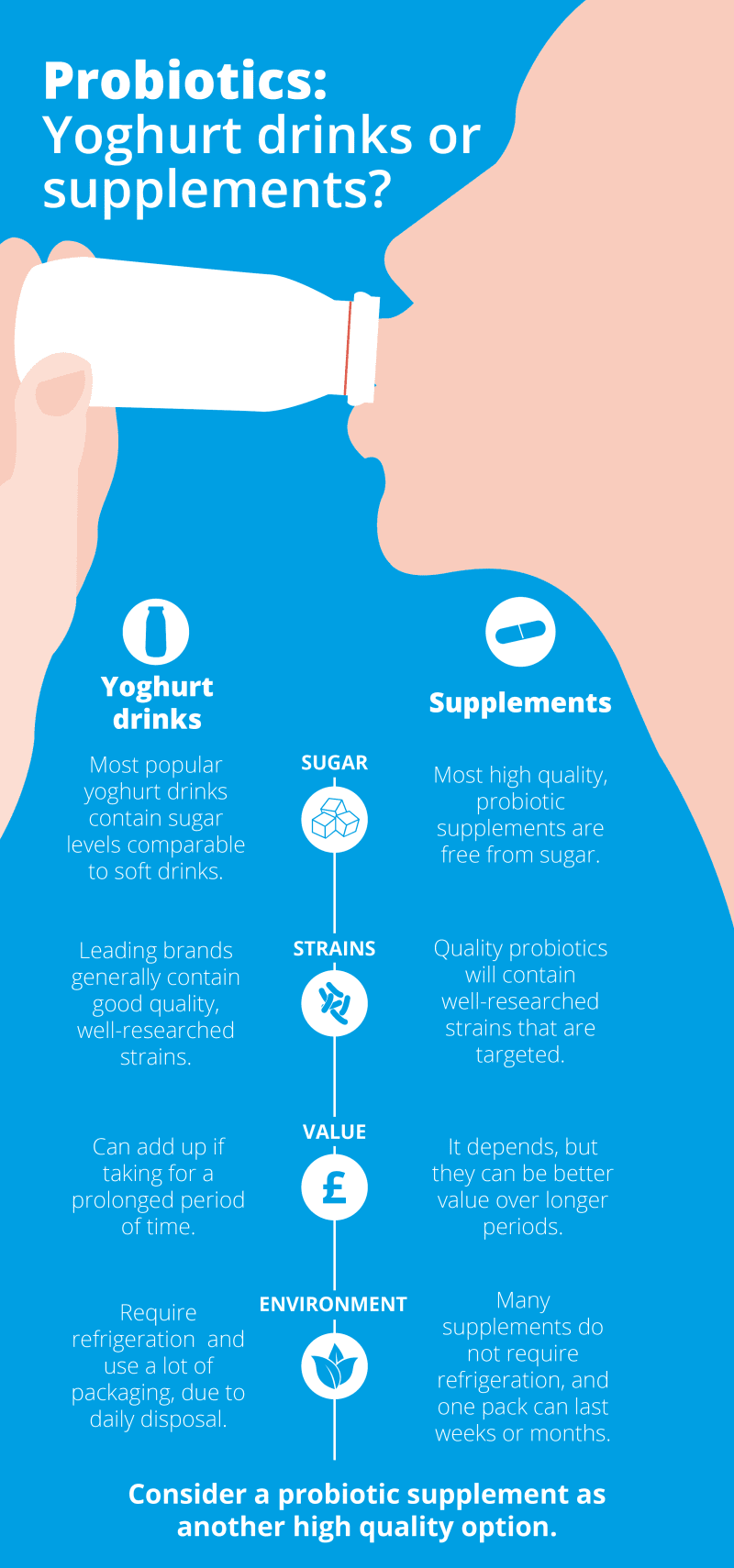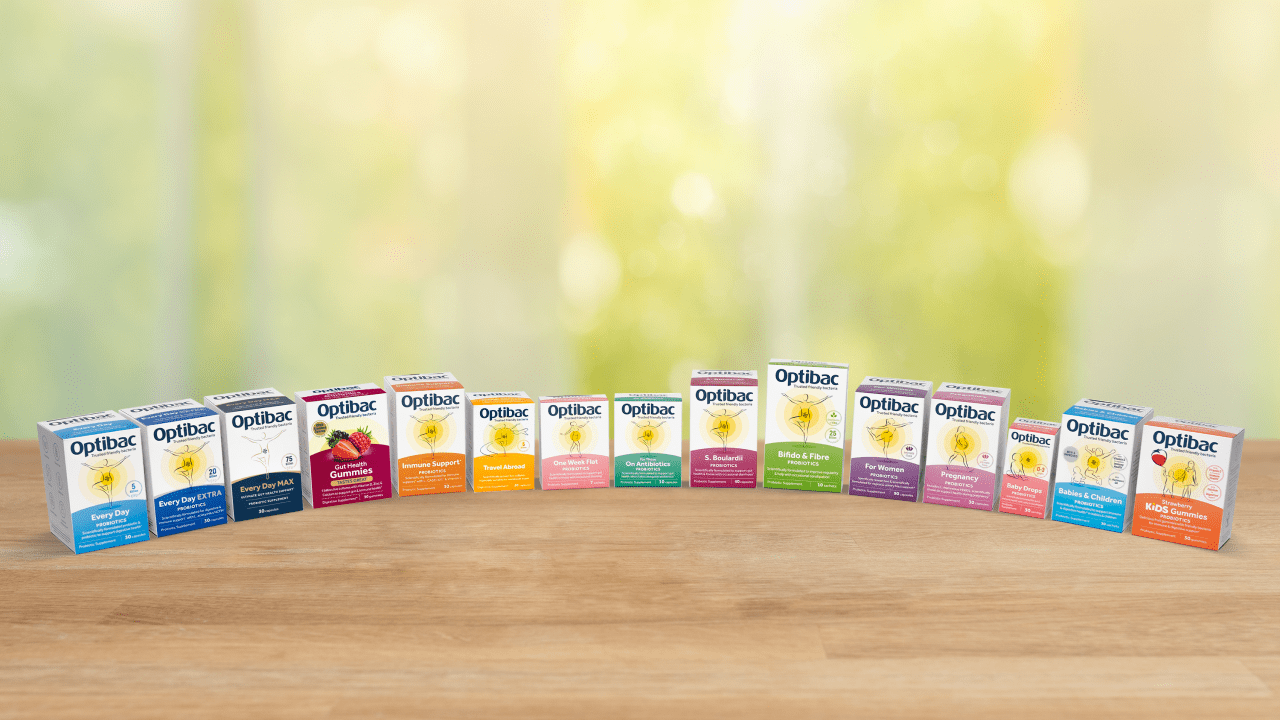Probiotic Supplements vs. Yoghurts
People have been ingesting probiotic bacteria for centuries, mostly in the form of fermented foods such as probiotic yoghurt. Yoghurt has long been used around the world as a health food and is a natural source of live probiotic cultures as well as providing protein, calcium and some B vitamins. Nowadays, we've come to understand that these friendly bacteria used to make yoghurt are good for our health, and this first led scientists to investigate the fascinating world of probiotics. To learn more, read the article: Getting in a pickle - fermented foods versus probiotics.
- Probiotic yoghurt & yoghurt drinks - all you need to know
- Probiotic yoghurt drinks
- Are yoghurt drinks good for you?
- What is a probiotic drink?
- Are probiotic drinks as good as supplements?
The huge variety of yoghurts on offer, and often a lack of information about the specific species and strains of probiotic bacteria they contain, can make it difficult to compare them to probiotic supplements in terms of their natural bacteria value. How we consume probiotics these days is much more varied, and we have many choices available to us in the form of supplements, yoghurts, yoghurt drinks, kefir and kombucha - but which is the best for our health?
Probiotic Yoghurt & Yoghurt Drinks - All You Need To Know
Natural Bio-Yoghurt
Natural bio-yoghurt has long been used around the world, and is a natural source of probiotic bacteria as well as providing protein, calcium and some B vitamins. Natural bio-yoghurts are a fantastic way to get friendly bacteria into your diet, so we're big fans of these. On the other hand, where supplements may have the edge, is in providing some specifically researched strains of bacteria. Learn more by reading the article: Are all types (strains) of friendly bacteria the same?
Yoghurts with added probiotics
Yoghurts which add specific strains of friendly bacteria to their products are becoming ever more popular. You can find these on most supermarket shelves these days, and the choice is vast. These yoghurts can be a great way to take a specific probiotic strain, but it's worth paying attention to other ingredients such as sugar or sweeteners, which may also be added to these foods.
Probiotic yoghurt drinks
Yoghurt drinks are probably the most popular way of consuming probiotics, and the choice available to shoppers is diverse. Many of the market leading brands contain some very well-researched strains of bacteria, but below we take a look at the whole picture and evaluate some points you should consider when choosing between the well-known yoghurt drink brands, and a quality probiotic supplement.

A family of four would use 1460 plastic bottles per year and consume 17.5 bags of sugar if they each consumed 1 yogurt drink per day.
Are yoghurt drinks good for you?
There are several things when choosing a yoghurt drink:
- Sugar - many of the market leading yoghurt drinks contain high levels of sugar to give them that distinctive sweet flavour. Some of the best-sellers have sugar levels so high that they have proportionally more sugar than soft drinks.
- Specific probiotics - what sets quality probiotic supplements apart from yoghurt drinks, is that they contain specific strains of bacteria which have been very well-researched. This means that shoppers can often find a probiotic supplement to suit their own particular health needs.
- Environment - currently, yoghurt drinks are sold as individual plastic bottles, that are designed to be consumed once-a-day and then discarded. Not all of these plastics are recyclable, and there are no plastics that are 100% recyclable, so there is always an element of pollution from consuming these yoghurt drinks. Many probiotic supplements however, come in monthly courses, so the use of plastic is greatly reduced.
- Storage - yoghurt drinks often require refrigeration, and this obviously uses a lot of energy to produce, transport, and store. Supplements are often lighter than liquid products too, so the carbon footprint for transporting the products is a lot less due to the reduced weight. All in all, supplements have much less of an impact on the environment than yoghurt drinks.
- Value for money - if you want to take a probiotic every day on an ongoing basis, which can be the best way of keeping your friendly bacteria populations well-supported, it can be expensive to take yoghurt drinks daily. By comparison, it is a lot more cost effective to consume probiotic supplements. So all in all, you may want to consider taking a well-researched probiotic supplement, over sugary yoghurt drinks.
What is a probiotic drink?
Kefir
Kefir is a cultured, fermented drink, traditionally made from cows milk, with added starter ‘grains’. These starter grains look like gelatinous beads, and consist of both yeasts and bacteria alongside milk proteins and complex sugars. The resulting drink is thinner than yoghurt and has a slightly tart, sour taste. Kefir is rooted in the traditional diets of the mountainous regions of Eastern Europe, and whilst it was traditionally made from cows milk, today kefir is often made from goats or sheeps milk, plant-based milks (such as coconut, oat or almond) or even water, making it available to those following a vegan diet or those that are allergic to dairy.
One difference between kefir and yoghurt is that typically kefir ferments at room temperature whereas yoghurts start their culturing process under heat. It is thought that kefir may be superior to yoghurt in terms of its probiotic qualities, and over all nutrient profile, making it a beneficial addition to any healthy eating plan. However, it is still difficult to know the exact strains of probiotic bacteria or yeasts present in the product, which may mean that a good quality probiotic supplement, that specifies the strains it contains, could be a better option for those looking to improve specific health symptoms.
Kombucha
Kombucha has seen a huge surge in popularity in recent years, and can now be found in many supermarkets and health food shops. It is thought to have originated in Russia or Eastern Europe, and is a fermented, sweetened tea drink, made from either black or green tea. To make it, sweetened tea is fermented at room temperature for between 7-30 days with the addition of certain bacteria and yeasts in what is referred to as a SCOBY (symbiotic culture of bacteria and yeasts). Kombucha is therefore another good dietary source of friendly bacteria and in addition the drink is antioxidant rich, due to the polyphenols in green and black tea. However, it does also contain caffeine and very low levels of alcohol which result from the fermentation process, which may put some consumers off.
Are probiotic drinks as good as supplements?
Whilst each of the fermented foods and drinks mentioned undoubtedly have health benefits, the exact impact is difficult to quantify, as there are so many variables and levels of friendly bacteria and other nutrients may differ from batch to batch, and from producer to producer.
When addressing specific health concerns a well-researched probiotic supplement offers a far more targeted approach, and provides the correct strains of friendly bacteria to best support your individual health needs.

Read more, over in the Learning Lab:
Popular Articles
View all Probiotics articles-
General Health31 Oct 2023
-
Probiotics11 Oct 2023


